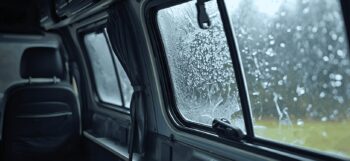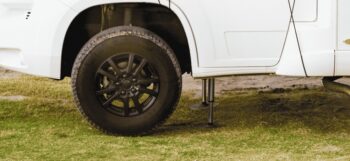Festival camping in a campervan, caravan, or motorhome is one of the best ways to experience multi-day festivals, without sacrificing comfort.
While camping in a tent has its appeal, having your own space with a proper bed, cooking facilities, and shelter from the elements can make a huge difference, especially as the weather in the UK can be so unpredictable.
However, camping at a festival is not like camping on a campsite. There are no designated pitches, no electric hook-ups, and often facilities are limited, which means preparation beforehand is key.
In this guide, we’ll cover everything you need to know, from booking and packing essentials to staying comfortable during the event and leaving no trace when it’s time to go home.
Booking for a festival
Why do I need to book early?
Festival vehicle passes are limited, and often sell out months in advance. Booking early can help you to secure a spot, as many festivals have designated live-in vehicle areas that are separate from tent campers. Some festivals also have early-bird tickets, allowing you to book at a reduced price and arrive before the main opening day.
Key things to check before booking
- Vehicle size restrictions – Some festivals impose length limits on motorhomes and caravans, so it is advisable to check the festival’s rules before booking.
- Passes & permits – Most festivals require a separate campervan, motorhome or long vehicle pass in addition to your festival ticket. Some may also require a car pass if you’re towing a caravan.
- Facilities available – Don’t expect electric hook-ups, water points, or grey waste disposal unless specifically mentioned. Festival fields are usually basic and only have toilet facilities and drinking water, so plan to be self-sufficient.
Best arrival strategy
Arrive earlier rather than later. Spaces are not marked, and it’s first-come, first-served. Arriving early increases your chance of getting a level pitch, although some festivals will turn you away if you arrive too early.

What should I pack for festival camping?
Packing for a festival means preparing for limited facilities and unpredictable conditions.
As previously mentioned, most festival fields won’t have electric hook-ups or proper waste disposal points nearby. You’ll need to be self-sufficient, bringing everything required to power your van, cook meals, stay clean, and handle whatever the weather throws at you.
Packing efficiently is key—bring too much, and you’ll clutter your limited space; forget the essentials, and you could be in for a frustrating weekend.
Here’s what you need to stay comfortable, prepared, and stress-free during your festival camping experience.
Essential gear
✔ Levelling ramps – Most festival fields are uneven. Levelling ramps will help to ensure your fridge functions properly and you are able to sleep comfortably.
✔ Solar panel or power bank – With no electric hook-up, you’ll need alternative ways to keep your leisure battery charged. If you do not have a solar panel already installed, you may want to consider a portable solar panel.
✔ Window covers & thermal blinds – These can help with insulation and privacy and also reduce condensation.
✔ Outdoor mat – Reduces the chance of mud being dragged inside.
✔ Reusable water containers – Essential for drinking water and washing up.
✔ First aid kit – Essential for festival camping, as minor injuries, blisters, or headaches can happen when you’re on your feet all day. This could include:
- Plasters (various sizes) – For blisters, cuts, and scrapes.
- Sterile dressings & bandages – Useful for larger wounds or injuries.
- Antiseptic wipes or spray – To clean cuts and prevent infection.
- Tweezers – Handy for removing splinters or insect stings.
- Scissors – To cut bandages, tape, or clothing if needed.
- Paracetamol or ibuprofen – For headaches, muscle pain, or fevers.
- Antihistamines – Helps with allergies, insect bites, or hay fever.
- Anti-diarrhoea tablets – Festivals can disrupt your stomach, and hygiene facilities may be limited.
- Rehydration sachets – Useful after a long day in the sun or if feeling dehydrated.
- Personal prescription medications – Ensure you bring enough for the entire festival.
- Cooling gel or foot spray – Helps soothe tired, swollen feet.
- High-factor sunscreen (SPF 30+ or 50) – To prevent sunburn.
- Aftersun or aloe vera gel – Soothes burnt or irritated skin.
- Lip balm with SPF – Protects lips from sun and wind exposure.
- Insect repellent – To keep mosquitoes and midges away.
- Bite & sting cream (e.g., hydrocortisone or antihistamine cream) – Reduces itching and swelling.
- Hand sanitiser – Helps maintain hygiene when soap and water aren’t available.
- Eye drops – Useful for dry or irritated eyes, especially in dusty festival environments.
- Earplugs – Not just for sleep, but also for protecting hearing at loud stages.

Cooking & food storage
Festival food stalls can be tempting, but relying on them for every meal can get expensive, especially if you are feeding a family. Long queues can also mean missing out on the action.
Bringing your own food and cooking essentials allows you to eat when you want, save money, and enjoy meals tailored to your taste. However, without electric hook-ups or fridges, you’ll need to plan your food storage carefully.
- Portable gas stove – Most festivals allow them but check the rules. When it comes to gas safety at festivals, gas stoves should be used with caution, especially when you are in close proximity to other campers.
- Cool box with ice packs – Keeps food fresh without relying on a fridge.
Pre-cooked & easy meals – Saves time and effort when you’re busy enjoying the festival. We recommend packing frozen meals that will slowly defrost over the course of your stay. - Snacks & hydration – Energy bars, fruit, and plenty of bottled water.
- Cash – There may be times when you fancy eating out. While most festival food stalls accept card payments, the signal in rural areas can be sketchy, especially when you are sharing a field with thousands of people. Carrying a small amount of cash can help in such situations where internet connection is not readily available.
Keeping clean
Staying clean can be a challenge. Showers, if available, often have long queues, and festival toilets can be far from your pitch and less than ideal. Planning with the right hygiene essentials will make a big difference to your comfort throughout the event.
- Festival showers vs. wet wipes – Some festivals have showers, but queues can be long. Wet wipes and dry shampoo are essential backups.
- Portable toilet or emergency toilet bags – Festival toilets are often busy, far away and not always clean. These are especially handy when camping with small children.
- Washing-up bowl – Handy for cleaning dishes without making a mess inside your van.
Arriving at the festival
Finding a spot to pitch up
Choosing the right spot to park your campervan, motorhome, or touring caravan can make a big difference to your festival experience.
Look for level ground to avoid sleeping at an angle and avoid low-lying areas where rain could pool and cause muddy conditions. If possible, park near an access route for convenience, but not too close to busy walkways where foot traffic and noise could become an issue. Be mindful of your surroundings—parking too close to tents or large groups could mean less privacy, more disruption, and decreased safety in the event of a fire. If you’re going with friends, try to arrange your vehicles in a way that creates a communal space in the middle.
Setting up
Once you’ve secured your spot, setting up efficiently will make your festival stay more comfortable.
- Park strategically – Leave enough space for doors to open and awnings to extend.
- Stake down everything – Festival fields can get windy. Secure awnings, gazebos, and any loose items.
- Mark your area – Use a groundsheet or barrier to define your space, especially if in a group.
Finding key locations and facilities
Once you’ve set up take some time to explore the festival site and locate key facilities, to ensure you're prepared for any situation. Here’s what to look out for:
- Water points & toilets – Knowing where they are will save time.
- Waste disposal areas – Most festivals have a tank for responsible grey water and toilet waste disposal. Bins are often provided in camping areas, but rubbish should be taken home if bins are not available.
Exits & emergency routes – Useful in case of bad weather or early departure.

Staying comfortable during the festival
Managing power & water
Without electric hook-ups, managing your resources efficiently is key to ensuring you have lighting and power.
Your leisure battery will only last so long, while you’re off grid, so conserving power and using energy-efficient solutions can keep everything running for longer. Water is another essential, so knowing when and where to refill will save time and hassle, especially during busy periods.
Small changes can make a big difference in keeping your setup running smoothly throughout the festival. Here are some simple but effective ways to manage your power and water efficiently:
- Conserve battery power – Use LED lights and charge devices during the day when solar energy is available. USB Lanterns can be charged before you leave home, to prolong the life of your leisure battery while you’re away.
- Refill water in 'off-peak' hours – Visiting water points early in the morning or late at night can help to avoid long queues. You may wish to travel with a small amount of water on board to get you through the first day, when many people are likely to be filling up.
- Take an adequate supply of gas – You may use more gas than normal to power your fridge and heating, if nights get cold. Ensure you have enough but be sure to adhere to festival guidelines on how much you can bring with you.
Beating festival fatigue
Festival camping is exciting, but long days, late nights, and unpredictable weather can take a toll on your energy levels.
Loud music, large crowds, late nights and early morning sunlight can make it hard to get proper rest, while fluctuating temperatures and sudden rain showers can leave you feeling uncomfortable and a bit miserable.
To avoid burning out, it’s important to plan with the right gear to help you sleep better, stay warm, and keep your essentials dry. Here are some simple ways to stay comfortable and keep festival fatigue at bay:
- Earplugs & eye mask – Help block out noise and early morning light.
- Layered clothing – UK festival weather is unpredictable; bring both warm and lightweight clothing. Dryrobe and equivalent brands of changing robes have become a popular choice for festival goes as they provide warm and protection from the elements.
Preparing for all weather
Festival camping means embracing the great outdoors, and in the UK, that can mean sunshine one minute and heavy rain the next. With the right preparation, you can enjoy the festival without worrying about what the weather might throw at you.
Wet weather camping
Rain is a common occurrence at UK festivals. When it hits, it can quickly turn a festival from fun to frustrating. But with the right gear, you can stay dry and still enjoy the experience.
Here’s a checklist of what to pack for rainy weather:
- Waterproof clothing (jackets, trousers, and rucksack covers)
- Awning or pop-up shelter for additional outdoor protection
- Extra towels to dry off wet clothes, shoes, and surfaces
- Waterproof footwear, such as wellies or hiking boots, to keep your feet dry while walking on soggy ground

Mud-proofing your setup
With rain often comes mud. The key is to create barriers between the muddy ground and your living space to keep everything as dry as possible.
Start by laying down ground sheets and mats at the entrance to your vehicle or outdoor setup. These will trap dirt and mud before it makes its way inside, saving you from hours of cleaning later.
Shoe covers are your best friends in wet conditions. They can help to prevent mud from being tracked inside your unit. You can slip them on when you return to your vehicle, helping to keep the inside clean.
Hot weather
When the sun shines at a festival, it’s a welcome break from rain, but high temperatures can quickly turn your campervan, motorhome, or touring caravan into a sauna.
Ventilate your campervan as much as possible. Open windows and use reflective covers on the windows during the hottest parts of the day to block out direct sunlight. These covers help keep your living space cooler by reflecting heat and reducing the amount of warmth entering the vehicle.
Staying hydrated is critical in hot weather. Make sure you have a full water container within easy reach, and drink regularly throughout the day, especially when you're outdoors in the sun. Having ice-cold water on hand can be a refreshing relief when temperatures soar.
Battery-powered fans can make a huge difference in the air circulation inside your unit. Many are compact enough to be stored without taking up much space. They provide a cool breeze and can help prevent the inside from feeling stuffy or overheated.
Here’s a quick list of ways to keep your campervan cool in hot weather:
- Reflective window covers to block heat and sunlight
- Plenty of water to stay hydrated throughout the day
- Battery-powered fans to circulate air and cool down the space
Cold nights
Even in the summer the nights can get surprisingly cold, especially if you're camping in an open field with little shelter. The drop in temperature can make it difficult to sleep, and without proper preparation, you could find yourself shivering through the night. Staying warm is all about layering up, insulating your campervan, motorhome, or touring caravan, and using simple heat-retaining solutions.
Start by packing thermal blankets and extra layers to trap body heat. A good-quality sleeping bag rated for colder temperatures is a must, and layering up with fleeces, hoodies, and thick socks will make all the difference. If you tend to feel the cold easily, thermals or base layers will help keep you warm without adding bulk.
A hot water bottle is a simple but effective way to stay cosy at night. Fill it up before bed and place it inside your sleeping bag or under your blanket for instant warmth. It’s a great alternative to electric heaters, which aren’t always practical at festivals.
To keep the warmth inside your vehicle, consider using insulated curtains or reflective covers on your windows. These help to retain heat, preventing the inside from cooling down too quickly overnight. If your campervan or motorhome has a draughty area, adding extra insulation, such as rugs on the floor or draft excluders, can make a big difference.
Here’s a checklist for staying warm during cold festival nights:
- Thermal blankets and extra layers to trap heat
- A high-quality sleeping bag rated for low temperatures
- Hot water bottle for a simple, electricity-free heat source
- Insulated curtains or reflective window covers to keep warmth inside
- Thick socks, gloves, and hats to prevent heat loss from extremities
By preparing for chilly nights, you’ll sleep more comfortably and wake up refreshed, ready to enjoy another day of festival fun.
High winds
Strong winds can be one of the biggest challenges when festival camping, especially in open fields with little natural shelter. High winds can cause awnings to collapse, tents to tear, and unsecured items to blow away. Preparing for windy conditions in advance will help you avoid damage to your setup and ensure a safer, more comfortable stay.
Start by positioning your campervan, motorhome, or caravan strategically. If possible, park with the nose or rear facing the wind rather than broadside, as this reduces the impact of strong gusts. If you're in a caravan, ensure the handbrake is fully engaged, and use wheel chocks to prevent movement.
Securing any outdoor equipment is essential. Awnings, gazebos, and windbreaks can quickly become a hazard in high winds, so always use strong pegs, guy ropes and storm straps. If the wind picks up unexpectedly, consider taking down your awning to prevent it from getting damaged or becoming a safety risk. If you are in campervan, you should also consider putting your pop-top roof down until the wind subsides.
Loose items can easily be blown away, so store lightweight gear such as camping chairs, tables, and cooking equipment inside overnight or when not in use. If you have an outdoor storage box, ensure it's properly closed and weighted down.
Here’s how to secure your setup in high winds:
- Face your vehicle into the wind to reduce resistance
- Use storm straps and heavy-duty pegs to secure awnings and windbreaks
- Bring extra guy ropes for additional support if needed
- Store lightweight outdoor items inside to prevent them from being blown away
- Check weather forecasts before setting up and adjust accordingly
Security & safety
Festival camping is all about fun and freedom, but it’s still important to stay mindful of security and safety. With thousands of people on-site, opportunistic theft can happen, and ensuring your campervan, motorhome, or touring caravan is secure will help to offer peace of mind while you enjoy the event.
Taking a few simple precautions can help prevent theft and accidents:
- Lock your campervan when you leave to explore
- Always store valuables out of sight
- Follow gas safety guidelines—only use approved bottles and check for leaks
Packing up & leaving no trace
When the festival comes to an end, it’s important to leave the site just as you found it. Festival camping follows the "leave no trace" principle, meaning you should take everything you brought with you and leave nothing behind. A responsible exit ensures the festival grounds remain clean and usable for future events while also making pack-up smoother for yourself.
Start by doing a final sweep of your pitch to check for forgotten items and waste. Even small bits of rubbish like bottle caps or wet wipes can add up and create a mess for organisers to deal with. Having bin bags on hand makes it easy to gather up litter before you leave. If you used a pop-up tent or temporary shelter, pack it away properly instead of abandoning it—many discarded tents end up in landfills unnecessarily.
Responsible waste disposal
Handling waste correctly is a key part of festival camping. Make sure you:
- Use festival-approved waste points – Never empty grey or black water directly onto fields. Most festivals provide designated disposal areas for chemical toilet waste.
- Pack bin bags – Keep all rubbish contained and dispose of it properly. Having separate bags for general waste and recycling makes the process easier.
- Recycle where possible – Many festivals have designated recycling stations. If bins aren’t available, take your recyclable waste home with you.
Best Time to Leave
Exiting the festival can be chaotic, especially when thousands of vehicles are trying to leave at the same time. Planning your departure wisely can save you hours of queuing.
- Avoid peak times – The busiest periods are often mid-morning when most campers pack up at the same time. Leaving early in the morning or later in the afternoon can help you avoid traffic congestion.
- Prepare for muddy exits – If the ground is wet, getting stuck is a real risk. Keep traction mats or grip pads handy to help your wheels gain traction in the mud. Reducing tyre pressure slightly can also improve grip if needed.
Staying protected during festival camping
While no one expects to encounter problems at a festival, you should still consider how to best prepare.
Whether you're in a campervan, motorhome, or touring caravan, having adequate insurance and breakdown cover can save you time, money, and stress if something goes wrong. Festivals take place in remote fields, which means recovery services can take longer than usual, and repairs might not be straightforward. Ensuring you’re covered before you set off can offer peace of mind.
With 50 years behind us, we know a thing or two about leisure insurance. We have a range of insurance options to cover your touring caravan, motorhome or campervan and Our motorhome breakdown cover and caravan breakdown cover aim to keep you on the road.
For further information visit lifesure.co.uk or contact us on 01480 402 460
Festival camping FAQs
Can I bring a generator to a festival?
Most festivals ban generators due to noise and fumes. Use solar panels or leisure batteries instead.
How do I keep my campervan powered without an electric hook-up?
Use solar panels, power banks, and energy-saving measures like LED lighting.
Are awnings allowed at festivals?
Some festivals allow them, but space can be limited. Check festival guidelines before bringing one.
What’s the best way to secure my campervan at a festival?
Lock all doors and windows when unattended, store valuables out of sight, and park in a well-lit area.
What should I do if my vehicle gets stuck in mud?
Carry grip mats or traction boards. Avoid spinning the wheels—rocking the vehicle back and forth helps.
Disclaimer: The sole purpose of this article is to provide guidance on the issues covered. This article is not intended to give legal advice, and, accordingly, it should not be relied upon. It should not be regarded as a comprehensive statement of the law and/or market practice in this area. We make no claims as to the completeness or accuracy of the information contained herein or in the links which were live at the date of publication. You should not act upon (or should refrain from acting upon) information in this publication without first seeking specific legal and/or specialist advice. Lifesure Group Limited trading as Lifesure and Lifesure Insurance Broker accepts no liability for any inaccuracy accepts no liability for any inaccuracy, omission or mistake in this publication, nor will we be responsible for any loss which may be suffered as a result of any person relying on the information contained herein.
FP199-2025











